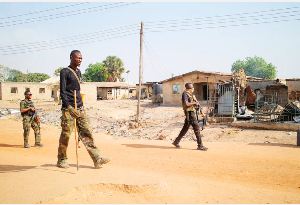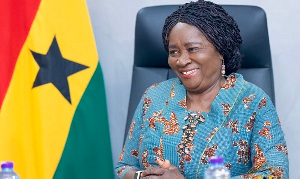Business News of Monday, 14 October 2019
Source: Selorm Helen
Land disputes: Licensed Surveyors Association meets to find lasting solutions
Members of the Licensed Surveyors Association of Ghana (LISAG), a potent actor for policy advocacy in the land sector, are manning up against the rather increasing land ownership disputes in Ghana.
The association has announced that, it would embark on advocacy actions to compel the strict enforcement of Regulation 10 of L.I.1444 which provides for “Plan of Partly Surveyed Land not to be approved”.
President of LISAG, Lic. Surv. Kwame Tenadu who made this known, is convinced that, the advocacy would “trigger the enforcement of the Constitutional mandate of the Lands Commission in Art.258 section (1) subsection (d) to ensure ‘the execution of, a comprehensive programme for the registration of title to land throughout Ghana;’”.
Lic. Surv. Kwame Tenadu was speaking at the maiden seminar and general meeting of LISAG in Accra, on the theme, ‘Land Ownership and Registration: The role of the Licensed Surveyor’.
The seminar brought together, members of LISAG and key stakeholders in the land sector and offered the platform for the deliberation on the roles of a licensed surveyor in the processes of land acquisition, the legalities involved in owning and registering land, and also examined which local mechanisms to employ to bring a lasting solution to land disputes in the country.
According to Lic. Surv. Tenadu, “The endless incidents of land ownership disputes in Ghana today and the need to come up with local strategy after years of trials and expensive adventure depending largely on foreign advice and borrowed capital (LAP 1 & 2) has influenced the choice of the theme for this meeting.”
He said, LISAG is resolute in contributing its quota towards the achievement of Government’s policy objective of “Ghana beyond aid” in the land sector.
As part of its efforts, the association “had an engagement with the World Bank during its ISM mission to Ghana in 2017/2018. We were encouraged by the desire of the World Bank to extend LAP 2 by focusing on private sector actors (e.g. LISAG) to support state Institutions for project implementation”.
“The task team leader having had a draft copy of a concept note which had been prepared for the then Minister of Lands and Natural Resources, Mr. Peter Amewu for his study found the worth considering. This concept note has since been approved by the Ministry of Lands and Natural Resources for LISAG to implement. LISAG was ultimately invited to Washington by ISM Task Team Leader for further discussion on private sector involvement in LAP 2.5 if government decided to proceed,” the LISAG President disclosed.
In the bid to unite land surveyors across the country as part of its policy action, LISAG has signed a Memorandum of Understanding with Kwame Nkrumah University of Science and Technology, George Grant University of Mines and Technology, University of Education Winneba, All Nation University, (ANU) Koforidua to promote collaboration in research, training and engagement in joint consultancies for the mutual benefit of the parties involved.
The Association has embarked on a Retention Policy tour to regulate the activities of quacks, and unauthorized surveyors who indulge in cadastral surveying services. Another objective of the Policy is to secure and protect the general public from the effects of supra and minimize the production of fake cadastral plans.
According to LISAG, “The Policy also created an enabling environment for high standard of cadastral surveying practice in Ghana with Licensed Surveyors being held accountable for the services provided to the general public. It is a step in the right direction and a laudable feat we, the members, have achieved together.”
He further encouraged the Association to act in compliance with the regulations of the job and the Constitution of Ghana to enable LISAG achieve its objectives.
“Before we set sailing, we should discuss the question on how Regulations 9 and 10 of Survey (Supervision and approval of plans) regulation 1986 LI1444 affect our practice whilst at the same time bringing to sharp focus chapter 5.3 of the Ghana Land Policy Document including the Constitutional directive in Article 258 (1) (d). As an association of land surveyors, ours is to obey policies, rules, regulations, laws on survey and the Constitution of Ghana respectively. This fundamental decision has to be taken by all of us at this meeting,” he advised.
Dr. Surveyor Lennox Agbosu in his key note address, outlined the history of land ownership in Ghana, how traditional lands were claimed and demarcated in the past and how these has translated into the disputes that characterised the system in recent times.
He observed that, until the introduction of commercial agriculture together with mining, timber industries and the concession boom in the 1880s, there was no extensive acquisition of land. Therefore, disputed claims over boundaries or their settlements were uncommon.
He explained that with the imposition of colonial rule, “all the petty polities were amalgamated into the Gold Coast as one country and the supposed boundaries which existed between the petty states remained undefined, un-demarcated and un-surveyed. However, the traditional schemes of tenure were being undermined through private acquisition of lands on a large scale. Acquiring lands in that way, cutting across natural and physical features which were customarily employed to define and distinguish boundaries, rendered the indigenous methods of boundary identification no longer adequate within the context of the new socio-economic order.”
Dr. Agbosu blamed the current problems in the land sector, including litigation and indebtedness on illiteracy, ignorance and lack of surveys.
“The situation was exploited by the predominantly illiterate and ignorant chiefs, who prompted by the prospects of pecuniary gains from the alienation of stools and family lands, made rival claims of rights over hitherto large tracts of land between them. Motivated, even as they were by greed and prospects of pecuniary gains, because they were ignorant and illiterate, they could not realise that they could have obtained by far, much more, than what they were receiving for what they were disposing of,” he stressed.
Backing his claim, Dr. Agbosu said, “A classic example of this is the negotiation and acquisition of the Adansi and Bekwai Concessions. That transaction is demonstrative of how the country’s resources have been dissipated for paltry sums on account of lack of surveys, ignorance and illiteracy. That concession, as large as 100 square miles, was obtained from the chiefs for a term of 100 years at the cost of 12 pounds and a bottle of rum”.
He noted that there have been legislations introduced to improve the system of land surveys but the problems relating to inaccurate surveys in the current land registration system persist.
“The Land Registry Act, goes farther than previous enactments in providing for accurate description of the land areas subject to registration by reference to a plan, but not far enough to make those requirements obligatory… Nevertheless, provided there are adequate means of checking the accuracy of such plans in the Lands Department, barring human errors, the registration of conflicting grants can be eliminated in the system altogether. But in all these, the expertise and the skill of the licensed surveyor is crucial for success in executing the programme,” he stated.
Pointing out ways to resolve issues on Land Title Registration, Dr. Agbosu said, “One of the most effective ways of avoiding conflicting registration would be to appoint competent personnel with special responsibility of checking the accuracy of every plan which may be attached to a registrable instrument, whether or not, it is certified by a licensed surveyor.”
“This could be done by getting the Survey Department directly involved in the registration exercise. Whether or not, independent land registries will be established in the near future, such participations by the latter Department in the programme of registration would seem to be inevitable,” he added.












